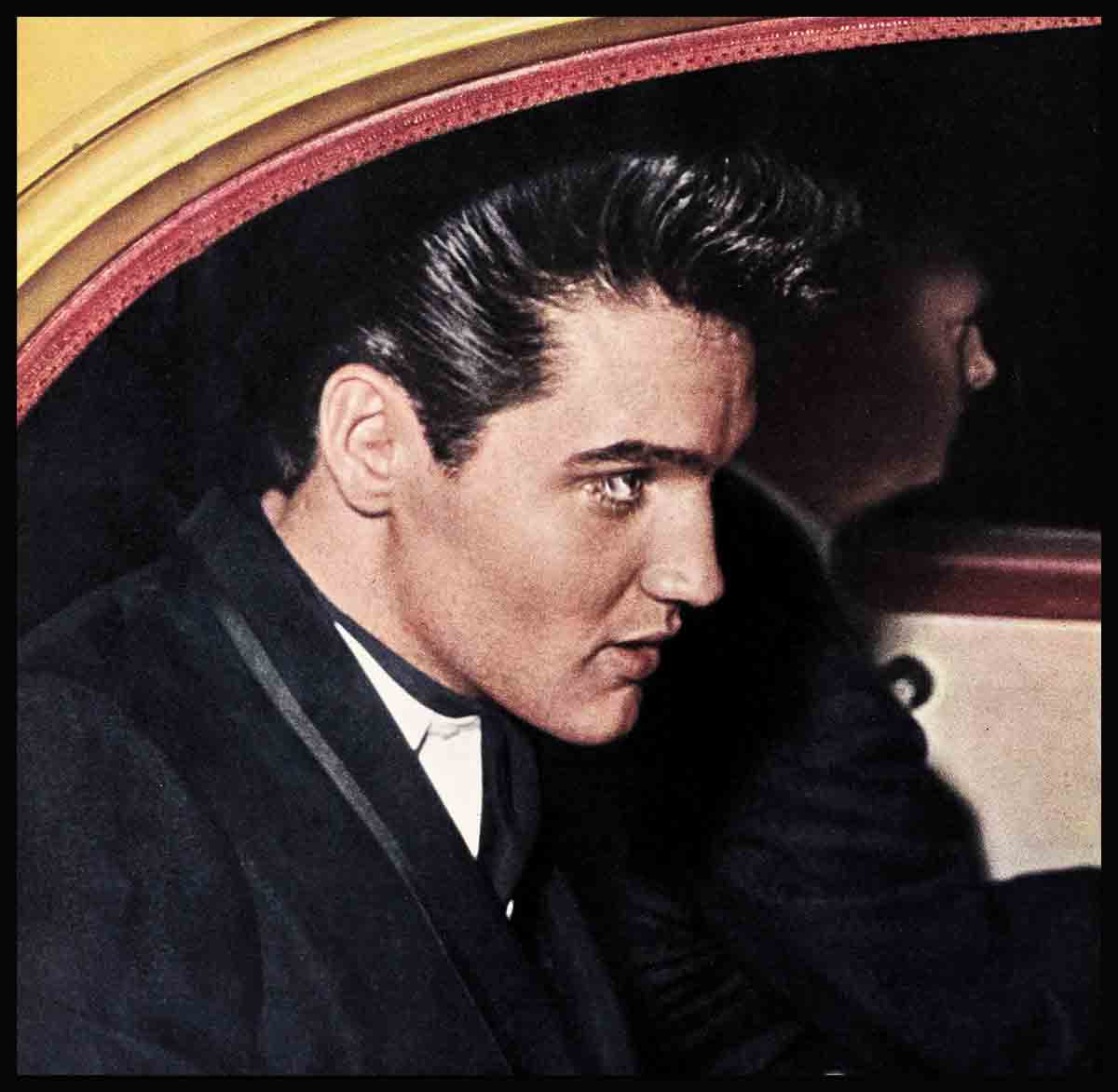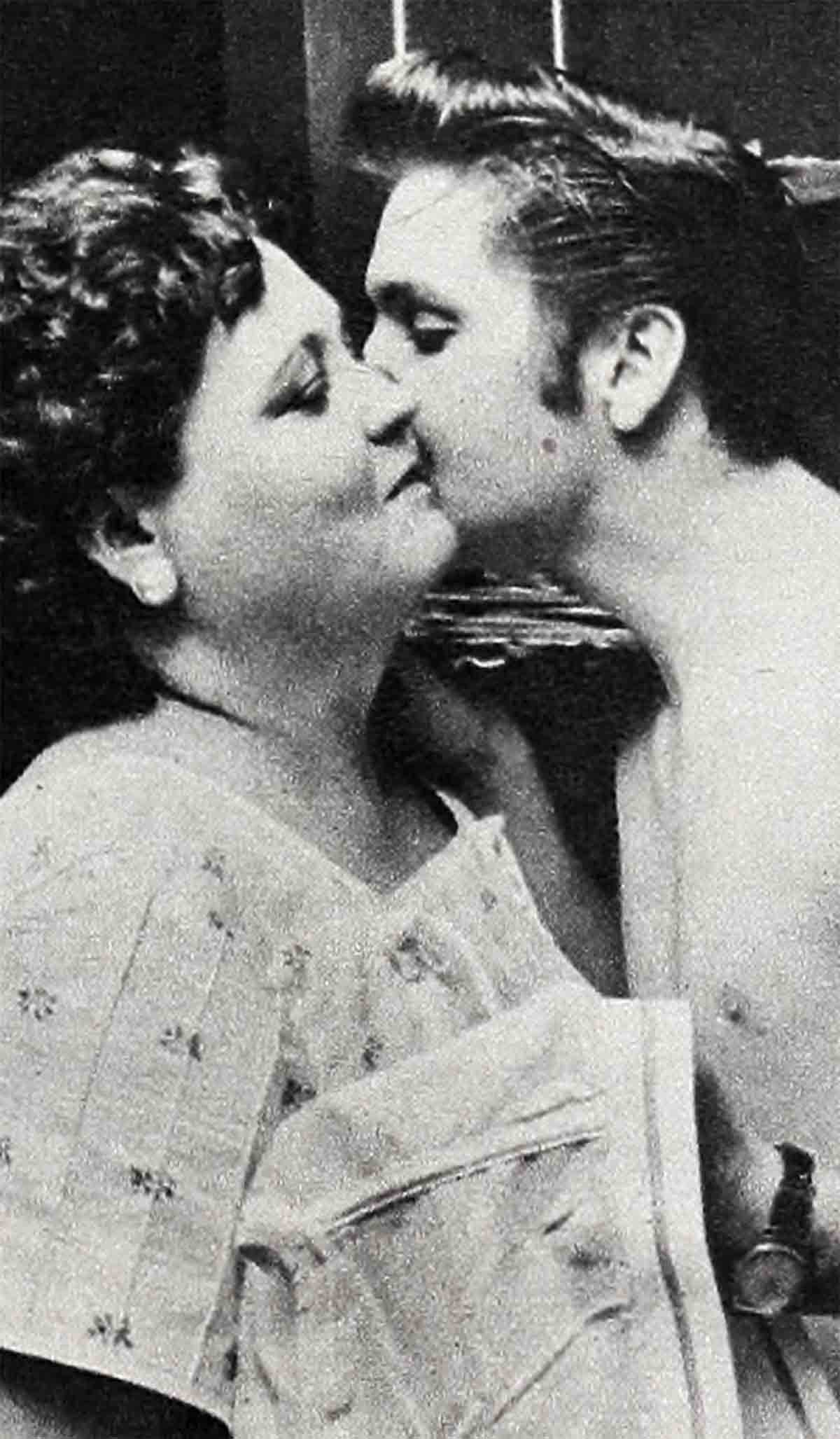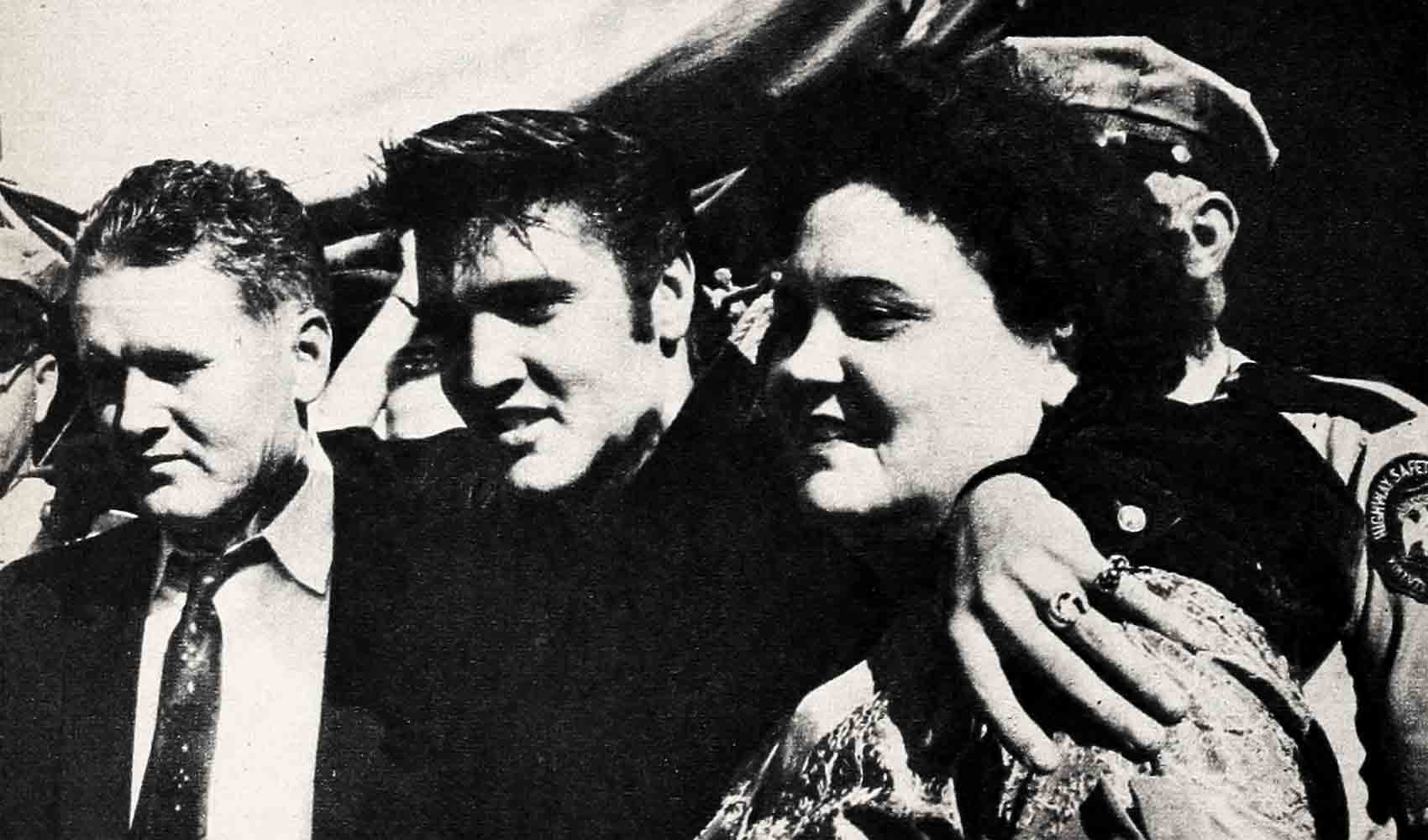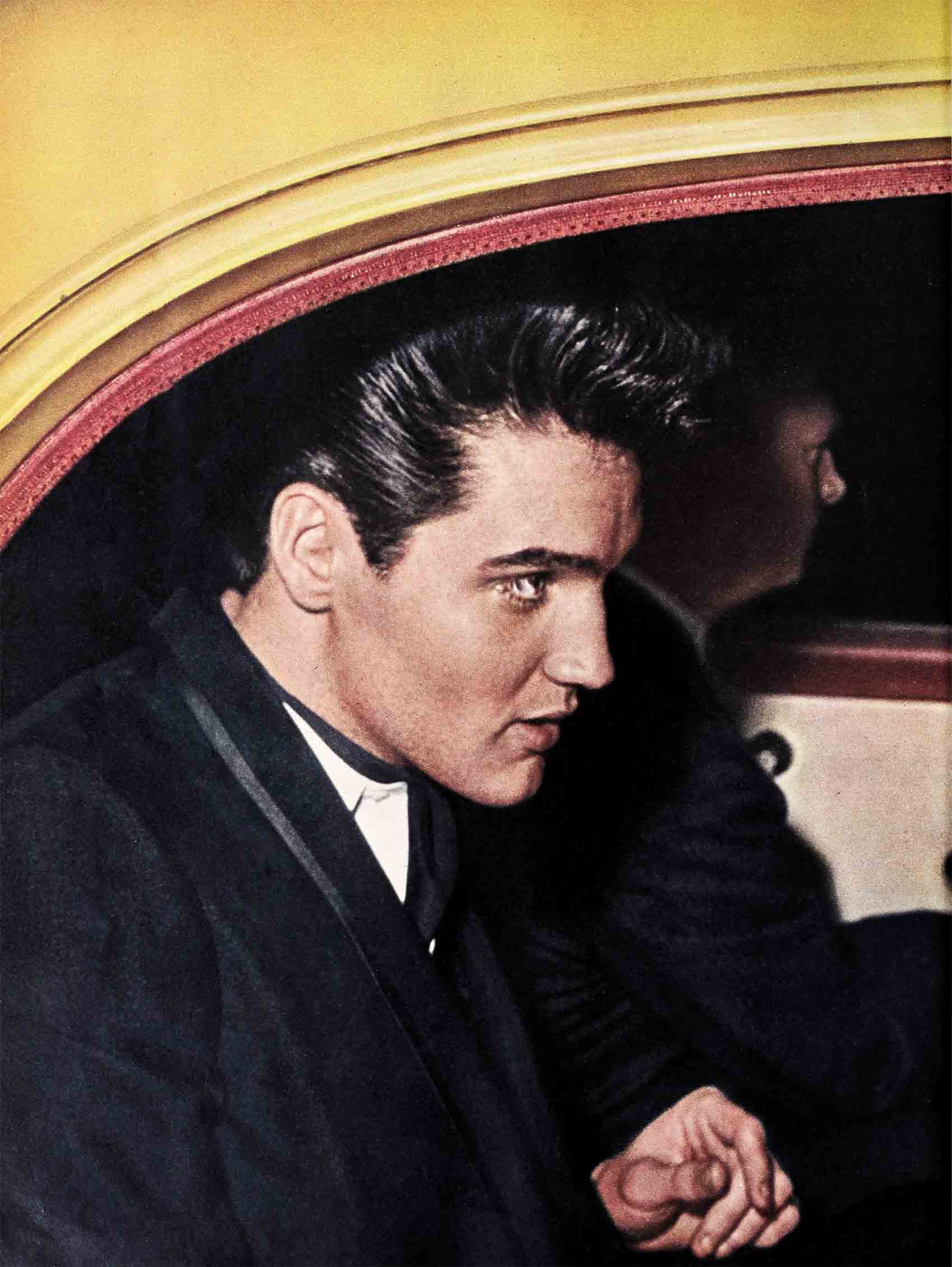
Elvis Presley: “If Only Mom Had Lived To See My Child”
“I would have wanted so much to have a family of my own,” Elvis Presley said. “A wife, kids—so my mother could have been a grandma.”
He spoke the words unconsciously—as though his mother’s death, just three years ago August 14th, had somehow lessened his chances of having such a family.
“She used to tease me,” he said, his voice warm with loving memory. “She’d ask me, ‘Elvis, when are you going to get married and make me a grandmother?’ And I would tease back—tell her that I would do all this for her when I found myself the right girl—a girl as nice as she was.
“Yes, we teased about it. But it would’ve made my mother the happiest woman on earth if she could have lived to see me settled down. She used to worry about me all the time—worry when I was away from home, was I eating proper and getting enough rest. She wanted to see I got the right girl, so she could be sure I was well taken care of.”
Elvis was away from home now as he talked—on location in Florida for “What a Wonderful Life.” If you didn’t know him, you’d think the title described his own life. We sat in an air-conditioned limousine during a break in the shooting, and outside, the merciless sun seared the dusty crew. But if Elvis was grateful for the comforts of his life—and he is—he was also too deeply involved in personal memories to pay much attention.
“My whole life has changed,” he said. “Nothing seems the same. If she were alive, I know things would be different. But with her gone—well, I just feel like throwing myself more and more into my work. Still I’m lonely.
“She was an angel,” he continued. “I loved her more than anything in this world. I’m grateful that she at least lived to see me make something of myself—but I miss her terribly . . . I miss her every minute of every hour of every day . . .” And then he told how his search for “the right girl” had been profoundly influenced by all his mother had taught him of right and wrong—of God and religion and a sense of ethics. Since little-boyhood, she’d taught him.
“I believe that with God’s help I will find the right girl,” he said, “and that with God’s help, and the things my parents have taught me, I will know when she comes along. As for what type of girl I’m looking for . . . well, when reporters used to ask me that question, I used to say: ‘I’m not looking.’
“Now I’d like to settle down—I think I’m about ready for a family. But it has to be right. When you’re raised in a home where marriage is beautiful, like it was between my mother and daddy, then a guy thinks long and thinks hard before he asks a girl to marry him.
“When my mother was alive, I used to get criticized a lot for inviting girls to visit me at my home. But honestly, that was the only way. To me a romance has to be a sacred, private thing, and the only place I could have that privacy was in my own home. My mother always enjoyed me having house guests. She felt good, sharing in my friends and good times. Now . . . well, now that she isn’t here, I still hold an image of what Mom would have wanted for me: a girl who would love me and make a home for me, and be a good wife to me and a good mother to our children.”
As Elvis spoke, I found myself thinking of the girls he’s dated in the past year: Juliet Prowse, Tuesday Weld, Joan Blackman, Anita Wood, and of course Nancy Sharp. He’d met Nancy’s folks in St. Louis at Christmas time, when things looked fairly serious between them. But he hadn’t asked her to Graceland. The person he’d have wanted her to meet, the person whose opinion he would have cherished, was no longer there. Perhaps the fact that he no longer had a mother whose approval he could obtain had affected his romance with Nancy. Soon afterwards she was dating Dick Beymer, and Elvis was seeing Joan Blackman and then others. Would he ever meet a girl, perhaps on another picture, who would make him feel that his mother would have approved if she were here to know her?
Lots of times I’ve been asked if I’d marry an actress,” Elvis was saying. “Well, I can tell you straight out that I don’t care what the girl I marry works at. It doesn’t matter to me what she does. I’ll marry an actress or a schoolgirl or a telephone operator. What does it matter? When I marry a girl, it will be because I love her. If a guy marries a girl just because she’s famous or rich, he’ll never make a go of it. My daddy met a woman with three little kids, and he married her. Oh, I know what people have been saying about him marrying a divorcée. Well, all I can say is this: My mother loved my daddy, so she would not have wanted him to live alone and unhappy. . . .”
Did Elvis realize that his mother would have felt the same way about him? He thought about that question.

“If Mom were alive today, I know she would want me to do certain things,” he said. “And so I pretend she is here, and I do them anyway . . . things like working hard but still getting enough rest, minding my manners and living a decent life. Whenever I think of doing something today, I always ask myself would my mother by happy and proud of the way I acted. If the answer is no, then I just don’t do it.”
And so perhaps Elvis feels that while his mother wouldn’t want him to be lonely—as he is today—there still is no girl she really would have wanted him to marry. Who that girl will be, or whether she’ll ever come along, is something nobody knows . . . least of all Elvis.
As we were talking, an extra—a young man about Elvis’ age—passed near the car, carrying a box lunch. He looked in at us, perhaps a bit envious of the cool interior of that long sleek car; then he walked on to a nearby tree, where he sat in the spare shade next to a couple of other young people. They began talking animatedly, smiling and gesturing as they shared a joke. Elvis looked at the group thoughtfully, then turned back to me.
“Maybe I sound ungrateful,” he said, “and I do have a lot to be grateful for.” He seemed to be trying to convince himself. “I’m not the first boy who ever lost someone he loved—but I can only feel strongly my own loss. If I live to be a hundred she’ll always be with me in my heart . . .”
Suddenly he broke in on himself.
“I don’t know what set me to talking so much,” he said apologetically, “except maybe today I really need to talk to someone. I get awful lonely sometimes, and I need to talk. Sometimes I even talk to my mother. I sit alone and talk to her just like she was in the same room with me . . . and you know, I feel she is. She is still so close sometimes that I feel as if I could reach out and touch her and kiss her, and feel her arms around me. Does that sound silly?
“I’d like to settle down”
“What did we start to talk about? Oh, yeah.” And he laughed. “Me and marriage. Well, sure. As I said before, I’d like to settle down—maybe I will soon. I’m getting tired of dating, the routine . . . you know . . . and it’s hard for me. Because, let’s face it, I’ve been hurt. Hurt by girls I thought liked me, who only used me for publicity. I guess I can’t blame some of them, because sometimes they’ve been tricked or trapped into talking about dates they’ve had with me. Only I wish someday I would meet a girl who didn’t find the need for sharing our dates with reporters.”
He looked down at his hands, then out the window at the scraggly landscape—the stunted trees and powdery soil. But his thoughts weren’t out there. Or even with the girls. They were with a happiness that was long ago and far away.
“When I think back to the years when the three of us were together . . .” he began. He bit his lips, stopped, then began again slowly. “We never had much. My folks could never really afford to buy me stuff. But at Christmas time they always managed to scrape a few dollars together so I’d have a visit from Santa Claus.” He smiled at the memory—tenderly—but the smile faded as quickly as it had come. “I never appreciated those lean years until now . . . when I can afford anything except the one thing in this world I want most—my mother.
“Having more cars or houses or clothes than you can use—that doesn’t make for happiness, and don’t let anyone kid you. It has to come from inside. It comes if you have a loving home . . . close family ties. If you’re with the people you love best, then you have happiness.
“When my mother first died, I couldn’t believe it. I kept asking myself, ‘Why? Why did it have to happen?’ I wanted so much to make her life beautiful . . . to give her everything . . . to make up for all the things she and my daddy did without, to buy things for me.”
If Elvis was unusually close to his mother—if he finds it impossible to banish her from his thoughts for even a day—he also loves his father deeply. He sympathizes with Vernon Presley’s efforts to build a new life, now that his Gladys is dead.
“It took my daddy time to find the right person,” he pointed out. “It took two years before he remarried. But it can’t be counted in terms of years, days or months. Until he met his new wife he was a very miserable, unhappy man. He came over to Germany with me and he tried to seem happy, but I knew he was miserable. . . . When he found someone he loved, he decided to get married. Sure we discussed it, but he didn’t ask my permission.” Elvis laughed at the thought of such a thing. “After all, he’s my father! And whatever he does, I respect him. What he does to make himself happy is none of my business, and I would never give him advice unless I saw him about to do something I felt he’d regret.

“Only one mother . . .”
“After all, I had only one mother, and she is gone . . . and now I have only one father, and whatever he wants to do is fine. I’m not going to have it on my conscience that I ever said or did anything to hurt him.”
Of his stepmother, Dee Dee, Elvis said, “She is a nice person. She’s had a lot of disappointments and unhappiness in her own life. She knows how I feel about her: that I will respect her because she is my father’s wife. But I told her from the beginning—I told her straight out—that I only had one mother in this world and I’ll never have another mother, or call another woman mother. Nobody can ever come even close to taking my mother’s place.”
Clearly Elvis is determined to treat his stepmother with friendship and courtesy. To do less would be a violation of Gladys Presley’s own teachings. For throughout Elvis’ poverty-stricken childhood, when the family seldom had enough for itself, his mother emphasized the importance of religion and the virtues attached to it. This is why Elvis’ first two in-person performances after his discharge from the Army were both charity shows. The first was held in Memphis last February 25th, to benefit local charities. The second took place exactly a month later, in Hawaii, on behalf of the U.S.S. Arizona memorial fund. The proceeds of the two shows added up to well over $100,000. So far, Elvis has yet to make a post-Army personal appearance for his own benefit, and this is almost unheard-of for a star who can command the huge fees he is constantly being offered. He knows that his mother would have wanted it this way, and that’s reward enough for him. He has tried to follow her ethical pattern throughout his life, and he feels this is the real reason for his success.
“I have a powerful faith in God and His will,” he told me. “I don’t know why I was singled out for success or fame, but in my heart I believe part of it is because I have always tried to live my life being good. I deeply believe that the way a person lives contributes to his success.

“Some things you don’t question”
“You know, that reminds me of a story. Maybe it doesn’t fit, but I’ve never told anybody before, and it’s a story I’ll always remember. . . . When I was a kid, there was a very rich man in our town. He owned a big plantation and he had a lot of poor sharecroppers working for him. He was mean—treated them like dogs. Then once there was a spell when we had no rain. Well, that man thought some of his crops would be ruined, and he got mad . . . mad at God! He ran out in his front yard and he looked up at the sky, and began cursing God. And right then and there a flash of lightning came and he was struck dead. That’s the God’s truth. I know it sounds weird, but it happened. In this world, there are things you just don’t question. . . .”
Elvis was silent again, brooding on this strange memory from out of his childhood. Then he brightened. “You know, I’ve been lucky. My folks always explained right from wrong, and reasoned with me. Sure I did some bad things when I was a kid . . . I remember once, when I was real little, I stole a chicken. When my mother found out, she made me take it back. I did, then when I got home she gave me a good whippin’. I’m not ashamed to say that in my day I’ve been whipped plenty for doing things I shouldn’t have. But always, when they punished me, my folks explained why and I never got a licking I didn’t deserve. Why, even just before my mother died, when I was already grown and on my own, if I did anything wrong I still got bawled out like I was a baby!”
The group of extras under the tree had finished their lunches and were walking back to the set. The sun continued to beat down mercilessly on the scattered clumps of mangrove and the small palmettos, but it was time to go back to work.
Elvis suddenly noticed his uneaten box lunch. He picked it up to take it back to the set where he could grab a bite between takes.
“Well, I’ve got to get back now,” he said. “See you again.” Then with a sudden and surprisingly shy smile, “. . . and thanks for letting me go on about my mother. It still helps me to be able to talk about her with someone. It helps a lot.”
THE END
Elvis Presley will soon be seen in the Paramount Pictures’ film. “Blue Hawaii.”
It is a quote. PHOTOPLAY MAGAZINE OCTOBER 1961





zoritoler imol
2 Ağustos 2023I gotta bookmark this web site it seems handy extremely helpful